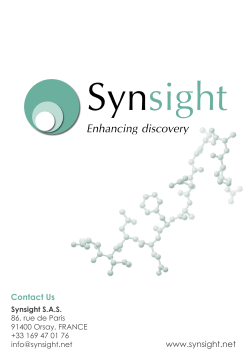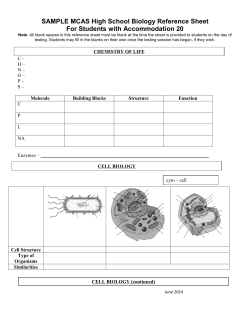
BIOL 4305-01 MOLECULAR BIOLOGY LABORATORY
BIOL 4305-01 MOLECULAR BIOLOGY LABORATORY Dixie State University – Spring 2015 Martina Gaspari, Ph.D. Course Catalog Description: Laboratory component of BIOL 4300. It reinforces basic laboratory skills and techniques in molecular biology and introduces students to advanced techniques. Students will learn principles and practice of nucleic acid purification (plasmid and genomic DNA, RNA), DNA restriction digestion and analysis, polymerase chain reaction (PCR), and more. Students will also learn the technical applications of polymerases, modifying enzymes, restriction enzymes and the different DNA cloning vectors. Prerequisites: BIOL 3455 OR BIOL 3555 (Grade C or higher) AND CHEM 3515 (Grade C or higher). Corequisite: BIOL 4300. 3 laboratory hours per week Time: Tuesday, 9:00 AM – 11:50 AM from January 12, 2015 to May 8, 2015 Room: SCI 136 CRN: 27319 Instructor: Martina Gaspari, Ph.D. Email: gaspari@dixie.edu Office Phone: 435-652-7786 Mobile Phone: 435-817-5133 The best way to reach me is through email, which I check often. Office Hours: MWF 2:00 PM – 3:00 PM, T 1:00 PM – 3:00 PM, or by appointment Office: Science Building, 1st floor, Room 122 (SCI122) Course materials: 1. Lab coat and lab goggles 2. Laboratory notebook of your choice 3. Calculator and ruler 4. Your own portable computer or iPad to bring to class (if you have one) 5. All additional materials are posted on Canvas and/or handed out in class Biology Learning Outcomes: Goal 1: Demonstrate breadth of discipline-specific knowledge Outcome 1: Students will describe and explain fundamental topics in five principal perspectives of biology: • The chemical and molecular machinations operating within all biological processes. • The centrality of genetic systems' governance of life's actions from the cellular to the phyletic. • The coordinated regulation of integrated cellular systems and their effect on the physiological functioning of organisms. • The dynamic interaction of living systems with each other and their environments. • The transforming role of evolution in changing life forms and how evolution explains both the unity and diversity of life. Goal 2: Demonstrate the capacity to think independently and critically Outcome 2: Students will employ scientific methods to acquire, analyze and apply knowledge of biological phenomena. Outcome 3: Students will evaluate scientific ideas and information while maintaining receptivity to potential alternative predications. Goal 3: Effectively convey scientific literacy through various mediums of communication Outcome 4: Reading Comprehension: Students will analyze and critique scientific literature: identifying hypotheses, critiquing methods, interpreting data and results, and articulating the context of discussions. Outcome 5: Written Communication: Students will produce well-written reports and/or research papers covering topics in biology. These papers will be presented in the accepted formats of scientific research articles. Outcome 6: Oral Presentation: Students will publicly present scientific information covering specific topics in the biological sciences. Presentations will adequately communicate data and information in a clear and logical format. Course Description: BIOL 4305-01 Molecular Biology Laboratory is a one semester, one credit laboratory. This course introduces the basic techniques and principles used in modern molecular biology. It is impossible to cover all the technology that is available to research scientists nowadays. The techniques you will learn are fundamental to molecular biology research and form a basis for understanding many more complex technologies. The following methods are taught in this lab: restriction digestion of DNA, blue/white cloning of a DNA fragment, Southern Blotting. A big parte of the lab course is dedicated to PCR, cloning and sequencing. Students will clone and sequence a portion of the GAPC gene from a plant of their choice. RT-PCR and DNA profiling conclude the course. Course Specific Objectives: Upon completion of the course, each student should: • Practice basic laboratory techniques and safety • Use restriction enzymes and gel electrophoresis to analyze DNA • Be familiar with Southern blotting • Be able to perform and analyze a PCR • Clone a DNA fragment gene of interest into a plasmid vector via ligation • Be familiar with RT-PCR • Understand modern DNA sequencing methods • Be able to read sequencing results and interpret them • Know how to work as a team in a molecular biology lab Course Points: Lab Attendance and Coursework (15 lab sections, 50 pts. each) 750 pts. Safety Quiz 50 pts. Lab Report (GAPC paper) 500 pts. 1300 pts. Grading Scale for the Course: 100% to 94% < 94% to 90% < 90% to 87% < 87% to 84% < 84% to 80% < 80% to 77% < 77% to 74% < 74% to 70% < 70% to 67% < 67% to 64% < 64% to 61% < 61% to 0% A AB+ B BC+ C CD+ D DF Lab Notebook: I would like each of you to learn how to keep a Lab Notebook, this is an essential part of a scientist’s work and it requires some learning. The golden rule is that everyone who goes through your lab notes should be able to repeat the same experiment you did and obtain the same result! Lab Report: One well-written laboratory report (GAPC paper), which covers part of the work done during the semester, is due at the end of the course. The laboratory report serves as an evaluation of your understanding of the project, your ability to synthesize your results into a broader context, your ability to think critically and creatively about your project and future experiments, and your ability to communicate scientific results in a written form. The report should be written in the format of a manuscript with a title, abstract, introduction, experimental procedures, results, discussion, and references. The due date for the GAPC paper (color paper copy) is the last day of lab, April 28 at 9 am. Delayed papers will receive a score of 0. Attendance Policies Attendance at all laboratory sessions is mandatory and is required to pass the Molecular Biology Laboratory Course. Attendance means arriving on time to section, prepared, dressed appropriately (closed shoes), and ready to carryout experiments in a safe manner. Students with two or more unexcused lab absences will receive an automatic zero for the total laboratory score and will not be allowed to pass the course. During the semester, students who show up to lab more than 15 minutes late will be given an unexcused lab absence and will not be allowed to perform the experiment. If you show up to lab and are not prepared – either improper clothes, no lab coat, you will have the first 15 minutes of lab to correct the policy infractions or you will incur in an unexcused lab absence and will not be allowed to perform the experiment. You are allowed ONE excused lab absence (only 50 points will be deducted) for the following reasons: • • • Official DSU sporting or academic events Doctor’s appointments not easily rearranged (foot surgery – yes, dental cleaning – no) Medical emergencies (ER visits, car accidents) • • • • Major illnesses (requiring medical attention) Family emergencies (death in a family, a medical emergency that requires your assistance) Major job training that cannot be rescheduled Medical, dental, and graduate school interviews If you feel your absence qualifies as described above, send me an email in advance if possible. The following reasons do not qualify for an excused lab absence: • Personal vacations of any type • Forgetting lab • Arriving 15 minutes late • Not obtaining proper PPE (right attire and lab coat) in the first 15 minutes of lab • Sleeping in • Partying too much the night before • Day of laziness Classroom Expectations: I expect students to be respectful of each other and of the instructor. Respect and good manners foster learning and understanding. For more details, please see the disruptive behavior policy at: http://www.dixie.edu/academics/disruptive_behavior_guidelines.php DSU POLICIES, PROCEDURES, AND SEMESTER DATES Click on this link - http://www.dixie.edu/reg/syllabus/ - for comprehensive information on the Semester Dates, the Final Exam Schedule, and University resources such as the library, Disability Resource Center, IT Student Help Desk, Online Writing Lab, Testing Center, Tutoring Center, and Writing Center. In addition, please review DSU policies and statements with regards to Academic Integrity, Disruptive Behavior and Absences related to university functions. If you are a student with a medical, psychological, or learning disability or think you might have a disability and would like accommodations, contact the Disability Resource Center (435-6527516) in the North Plaza. The Disability Resource Center (http://dixie.edu/drcenter/) will determine eligibility of the student requesting special services and determine the appropriate accommodation to their disability. Other: Mobile phones must be set to vibrate mode (or turn them off!) for all of your classes. Phones must be “off” during exams. Any behavior that disturbs the class will not be tolerated. Disclaimer: The instructor reserves the right to make modifications to this syllabus by announcing changes in class and/or postings to Canvas.
© Copyright 2025
















